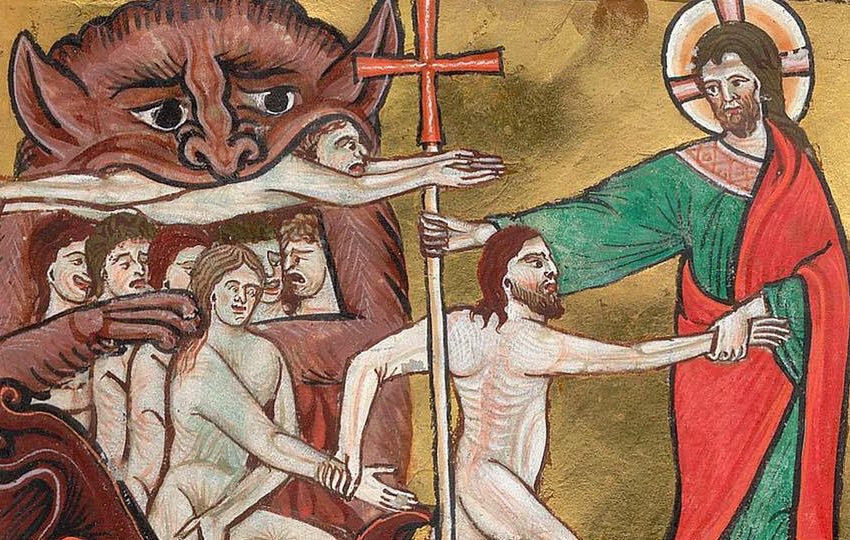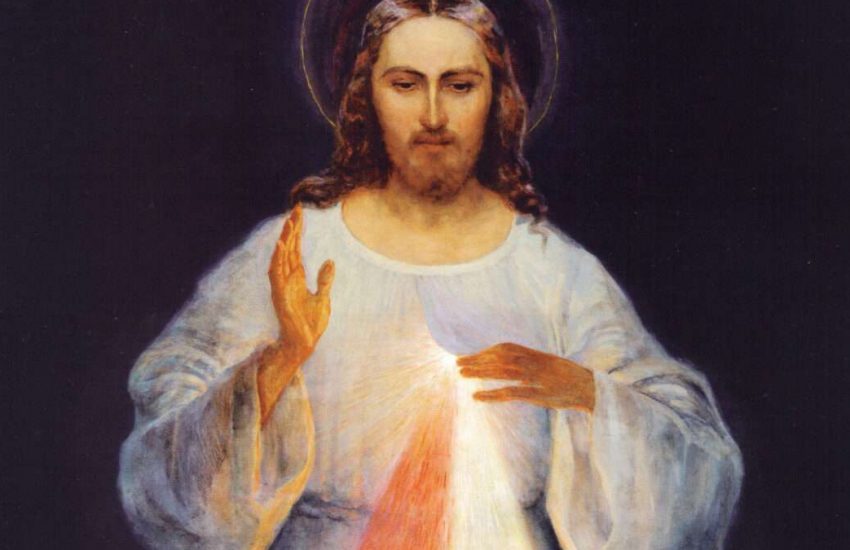Entering Into Christ’s Sabbath
Palm Sunday of the Lord’s Passion
Apart from the procession with palms, the long gospel reading of our Lord’s Passion makes the Palm Sunday Mass quite memorable for most people. The rubrics of the Mass for Palm Sunday even specify that the homily should be kept short — not to “make up time,” but because the gospel reading is really meant to stand on its own. Palm Sunday invites us to enter into the Lord’s Passion in a contemplative way — to experience it as an event rather than a lesson. The Passion is not a parable. It is our God giving himself to us fully and freely in love.
Therefore I want to focus on just one sentence in this lengthy gospel reading: the last sentence. After recounting Jesus’ triumphal entry into Jerusalem, his arrest and trial, his suffering and death, and his burial in the tomb, our gospel ends with a group of women who had followed Jesus from Galilee. The sabbath was about to begin, so they quickly prepared spices and perfumed oils for Jesus’ body. Then having done their work, “they rested on the sabbath according to the commandment” (Lk 23:56).
Sabbath Rest
The day between Good Friday, when our Lord died on the cross, and Easter Sunday, when he rose from the dead, was Saturday — the Sabbath day. This is no coincidence. Our Lord was taking his rest.
For the Jewish people, the sabbath was not merely a “day off” work. There was meaning to their rest. It was a day to remember the work that God had done for them, to appreciate its goodness, and to give thanks.
When we think of the sabbath, we likely think of the third of the Ten Commandments:
Remember to keep holy the sabbath day. Six days you may labor and do all your work, but the seventh day is the sabbath of the Lord, your God. No work may be done then either by you, or your son or daughter, or your male or female slave, or your beast, or by the alien who lives with you. In six days the Lord made the heavens and the earth, the sea and all that is in them; but on the seventh day he rested. That is why the Lord has blessed the sabbath day and made it holy.
Ex 20:8-11
But if we want to understand the origin of the sabbath, we have to look back even further. In giving the commandment to keep the sabbath, God points back to the very beginning, to the very origin of creation.
Thus the heavens and the earth and all their array were completed. Since on the seventh day God was finished with the work he had been doing, he rested on the seventh day from all the work he had undertaken. So God blessed the seventh day and made it holy, because on it he rested from all the work he had done in creation.
Gen 2:1-3
In the beginning…
Genesis describes God’s act of creation as taking place over the course of six days. These “days” are not literal 24-hour intervals, but represent different stages of creation, moving from the fundamental and simple to the more complex. The first thing created is light; then the sky and waters and dry land; then vegetation, followed by higher forms of life such as sea creatures, birds, and larger animals; finally human kind is made in the very image of God, and set as head over creation.
Each one of the stages is a “day.” And the description of each “day” ends in the same formulaic way: Evening came, and morning followed – the first day (Gen 1:5)… Evening came, and morning followed — the second day (Gen 1:8)… Evening came, and morning followed — the third day (Gen 1:13)… and so forth for all the days of creation.
Except the seventh day.
In the description of the seventh day, God’s day of sabbath rest, there is no “evening came and morning followed.” There is no end to the seventh day. Thus all of the scripture accounts that follow, describing God’s ongoing revelation of himself to his chosen people, take place on the seventh day.
The Eighth Day
Throughout history, God reveals himself more and more fully to the Jewish people, chiefly through the law and the prophets, until we find the fullness of God’s self-revelation in Jesus Christ (see Col 2:9).
In times past, God spoke in partial and various ways to our ancestors through the prophets; in these last days, he spoke to us through so son, whom he made heir of all things and through whom he created the universe.
Heb 1:1-2
Just as human kind was the pinnacle of God’s work on the sixth day, Christ’s incarnation was the pinnacle of God’s activity on the seventh day. God became man and dwelt among us.
At the end of each day of creation, God looked at what he had made and saw that it was good. The creation of man on the sixth day is no different. God looks at us as the work of his hands — the work that bears his very image — and sees our goodness. God sees creation, especially humanity, as so good that he desires to enter into creation himself as one of us.
But something happened on the seventh day while God rested. Man fell. Our relationship with our Creator was broken. And so in the fullness of time God sent his Son, born of a woman, born under the law, to ransom those under the law, so that we might receive adoption (see Gal 4:4-5).
Christ’s suffering and death, to redeem us from our sins, brings the seventh day of creation to its close.
It was now about noon and darkness came over the whole land until three in the afternoon because of an eclipse of the sun. Then the veil of the temple was torn down the middle. Jesus cried out in a loud voice, “Father, into your hands I commend my spirit”; and when he had said this he breathed his last.
Lk 23:44-46
As Jesus dies on the cross, the sun sets on the seventh day. As his body is laid in the tomb, Jesus enters into the final rest of his great sabbath.Evening came, and morning followed — the seventh day.
The morning that follows this final sabbath is the dawn of a new day of creation. “Behold, I make all things new” (Rev 21:5).
St. Paul teaches that anyone who is in Christ is part of this new creation. “Therefore if anyone is in Christ he is a new creation. The old has passed away. Behold, the new has come!” (2 Cor 5:17).
The Church Fathers speak of this new age of Christ as the “Eighth Day” of creation. This is why baptismal fonts in most churches traditionally are octagonal in shape — they have eight sides, signifying that when we are baptized we are born anew into this eighth day. This is why the day of Christian celebration is Sunday, the Lord’s Day. The first day of the week has become the last day (the alpha and omega), the first day of a new creation.
“This is the day the Lord has made” (Ps 118:24).
Enter Into My Rest
As Christians, we are children of the eighth day, the final day of creation. At our baptism we are not just reborn. We are recreated. But to rise with Christ at this new dawn, we must first sleep with Christ in the tomb. As we take up our personal crosses to follow him, we enter into his suffering. But we must also enter into his rest (see Heb 4:11).
As we enter into the mysteries of Holy Week, let us pause from the work of our day-to-day lives so that we may enter into the sabbath of our Lord, in anticipation of the eternal rest we hope to share with him in heaven.
- Prayer Suggestion: Spend time this week doing lectio divina (holy reading) with Hebrews chapter 4.



